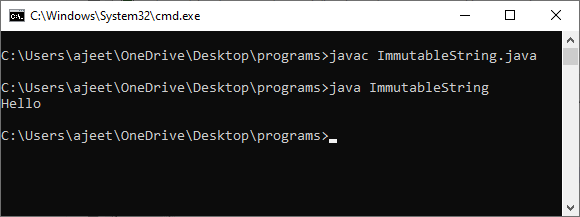What Is Immutable Strings and Exactly How It Functions
In the world of programs, understanding the concept of unalterable strings is vital for producing durable and safe and secure applications. Immutable strings refer to strings that can not be altered after they are developed, making certain information integrity and predictability within the code.
The Essentials of Immutable Strings
Immutable strings, as an essential concept in programs, are personality sequences that can not be changed when they are produced. This means that when a string is designated a worth, that value can not be altered. In languages like Python and Java, strings are unalterable objects, causing different ramifications in terms of memory monitoring and information honesty.
One of the crucial advantages of unalterable strings is that they give a complacency in data control. Because the web content of an unalterable string can not be customized, it makes certain that the original data remains intact, reducing the risk of unexpected adjustments throughout program implementation (Why are strings immutable in Java?). This building also simplifies debugging processes, as developers can trust that once a string is defined, its worth will certainly not be inadvertently altered
When a brand-new string is created based on an existing one, rather than customizing the initial string, the new value is saved separately. Generally, comprehending the essentials of immutable strings is critical for understanding programs ideas and enhancing code efficiency.
Benefits of Immutable Strings
Structure upon the safety and security and effectiveness benefits of immutable strings, their advantages expand to enhancing code integrity and streamlining concurrent shows jobs. By being unalterable, strings can not be changed after creation, which gets rid of the danger of unplanned changes in the information they keep. This inherent immutability ensures that once a string is developed, its value stays continuous throughout the program's execution, lowering the chances of bugs caused by unforeseen changes.
Additionally, unalterable strings add to code integrity by making it less complicated to reason concerning the state of a program. Considering that strings can not be altered, developers can trust that a string will always hold the exact same worth, streamlining debugging and upkeep initiatives. This predictability results in extra steady and dependable codebases.

Implementation in Programs Languages
Within different shows languages, the incorporation of unalterable strings is an essential aspect that influences how data is managed and manipulated within code structures. The execution of unalterable strings varies throughout different programs languages, with each language using its very own mechanisms to sustain this idea.

In contrast, languages like C and C++ do not have built-in assistance for immutable strings. Developers in these languages should by hand apply immutability by applying regulations within their code to protect against direct modifications to string objects.
Best Practices for Functioning With Immutable Strings
When managing unalterable strings in programming languages like Java and Python, sticking to finest techniques makes sure safe and secure and efficient data adjustment. Among the key finest practices is to use StringBuilder or StringBuffer as opposed to directly adjusting strings, particularly when taking care of comprehensive concatenation operations. These classes offer mutable choices for string manipulation, assisting to avoid unneeded memory allowances and boosting performance.
One more ideal technique is to make use of string interpolation or formatting functions given by the language as opposed to hands-on concatenation. This not just improves readability however additionally help in stopping usual challenges such as unintended string adjustments. Additionally, when collaborating with sensitive data such as passwords or API tricks, it is essential to stay clear of keeping them as ordinary message in unalterable strings. Making use of protected storage mechanisms like char ranges or specialized collections for handling delicate info aids reduce protection risks connected with immutable strings.
Real-world Applications and Instances
Checking out sensible applications of unalterable strings in different sectors reveals their significant effect on data integrity and system integrity. In the medical care market, immutable strings play an important role in ensuring the security and privacy of patient data. By preventing unapproved modifications to delicate details such as medical records and prescriptions, unalterable strings help maintain conformity with strict personal privacy guidelines like HIPAA.
Banks also take advantage of the unalterable nature of strings to enhance the safety of consumer data and purchase documents. Immutable strings aid prevent fraudulence and unauthorized modifications to economic details, giving a robust protection against cyber dangers and making certain the depend on and confidence of customers.

Conclusion
Finally, unalterable strings are dealt with and unchangeable sequences of characters that provide advantages such as string safety and enhanced efficiency in shows. They are executed in different programs languages to ensure information honesty and safety and security. Finest practices for dealing with immutable strings include preventing direct alterations and using techniques that return new string items. Real-world applications of unalterable strings consist of data file encryption, caching, and string control tasks.
Immutable strings refer to Clicking Here strings that can not be altered after they are developed, making certain data honesty and predictability within the code. When a new string is developed based on an existing one, instead than modifying the original string, the brand-new value is kept independently.In languages like Java and Python, strings are unalterable by default, indicating that when a string object is produced, its value can not be changed - Why are strings immutable in Java?. Finest methods for functioning with immutable strings consist of avoiding direct adjustments and making use of techniques that return new string items. Real-world applications of immutable strings consist of information security, caching, and string control tasks